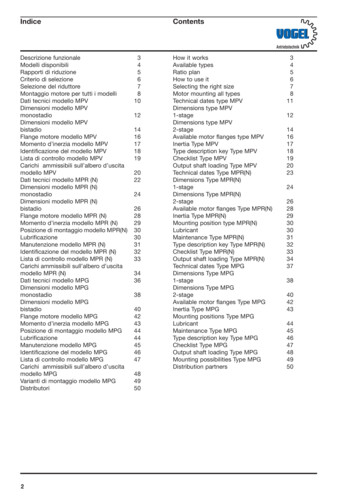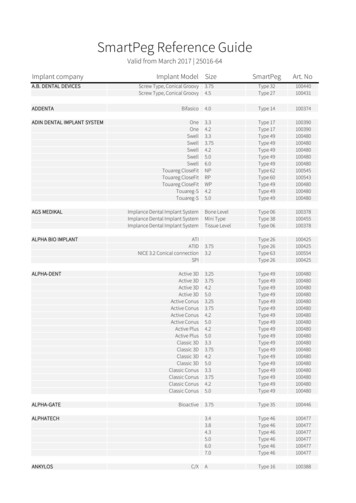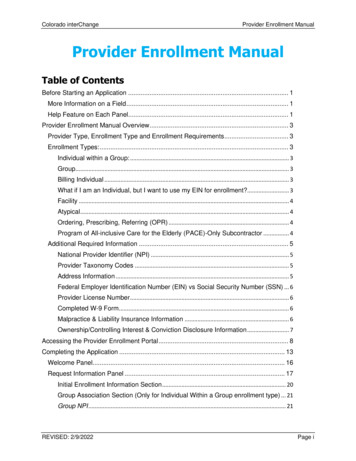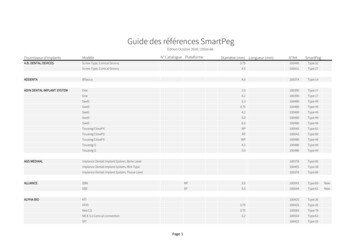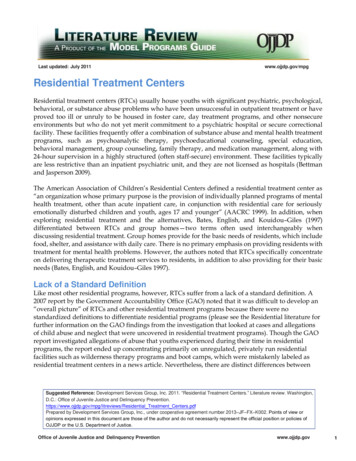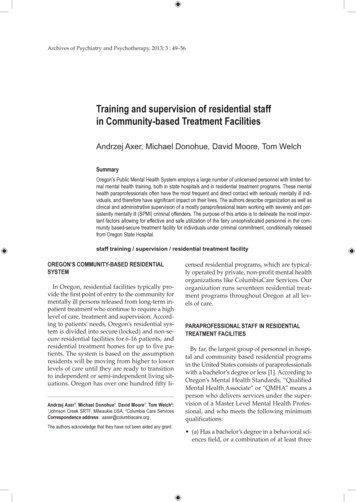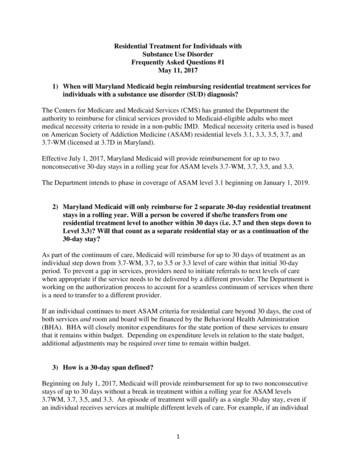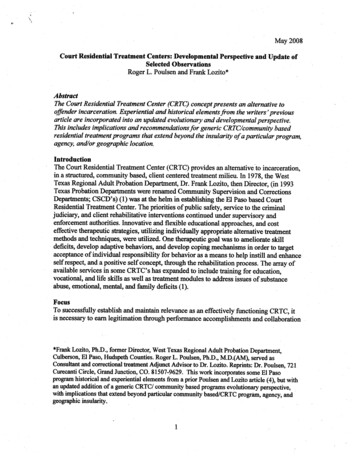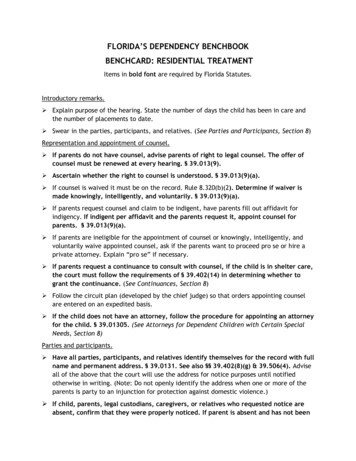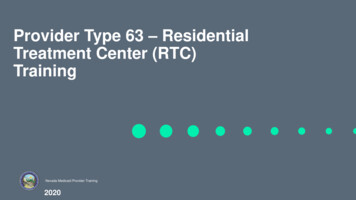
Transcription
Provider Type 63 – ResidentialTreatment Center (RTC)TrainingNevada Medicaid Provider Training2020
Objectives- Residential Treatment Center (RTC)- Provider Discharge Planning- Recipient Eligibility- Nevada Medicaid Website- Prior Authorization: Initial & Concurrent Review- Billing Guideline- Submit a Prior Authorization via the ElectronicVerification System (EVS)- Submit a Claim via Direct Data Entry (DDE)through EVS- Appeals: Peer-to-Peer and Reconsideration- References- All-inclusive Rates- Questions- Therapeutic Home Passes- Quarterly Family Visits- Acute Care- Critical Interaction or EventsNevada Medicaid – Provider Type 63 (Residential Treatment Center) Provider Training2
Residential TreatmentCenter (RTC)Nevada Medicaid – Provider Type 63 (Residential Treatment Center) Provider Training3
Residential Treatment Centers (RTC)RTC requirements:- Are delivered in multiple facility types, also known as Psychiatric Residential Treatment Facility(PRTF) (42 CFR 441.151(a)(2), Subpart D).- Are for recipients under age 22 and must be being provided before the individual reaches age 21 (42CFR 441.151(a)(3), Subpart D).If the individual was receiving services in an RTC immediately before reaching age 21, these servicesmust be:- Provided before the date the individual no longer requires the services; or- Provided before the date the individual reaches 22; and- Certified in writing to be necessary in the setting in which it will be provided.RTC must also meet the requirements and submit a self attestation letter for Conditions of Participation forthe use of restraint and seclusion (42 CFR 483.352, Subpart G).Nevada Medicaid – Provider Type 63 (Residential Treatment Center) Provider Training4
Recipient EligibilityNevada Medicaid – Provider Type 63 (Residential Treatment Center) Provider Training5
Recipient Eligibility: Verification- Verify recipient eligibility monthly.Eligibility is determined on a monthlybasis and may change.- Options for verifying eligibility are:- Electronic Verification System(EVS): To access EVS, visitwww.medicaid.nv.gov. Select the“EVS” tab to review the UserManual and to register or login toEVS. EVS is available 24 hours aday, 7 days a week.- Automated Response System(ARS): To access ARS, call (800)942-6511.Nevada Medicaid – Provider Type 63 (Residential Treatment Center) Provider Training6
Recipient Eligibility: Retrospective Authorization- If the recipient loses eligibility during the stay, request a Retrospective Authorization using form FA-15or form FA-13 found at aspx. Check“Retrospective Authorization” at the top of the form.- If the recipient is currently a patient at the RTC, the provider has 10 business days from the date ofdecision of recipient eligibility to submit their retrospective review.Nevada Medicaid – Provider Type 63 (Residential Treatment Center) Provider Training7
Prior Authorization: InitialReviewNevada Medicaid – Provider Type 63 (Residential Treatment Center) Provider Training8
Prior Authorization: Initial Review- All RTC initial admission requests must besubmitted using form FA-15, which should besubmitted via the Provider Web Portal no lessthan five business days prior to the recipient’sadmission or transfer. (MSM Chapter 400,Section 403.8C.1)- The FA-15 can be found on the ProvidersForms webpage s.aspx.- The QIO-like vendor will notify the provider ofthe outcome within 5 business days of receipt.(If sent to physician for review, allow anadditional 2 business days.)Nevada Medicaid – Provider Type 63 (Residential Treatment Center) Provider Training9
Prior Authorization: Initial Review, continuedPrior authorization (PA) may be requested for upto 90 days and must include:- Certificate of Need (CON) signed by the RTCphysician; the CON is included within the FA15 form- A current psychiatric evaluation (Currentwithin 6 months of the admission date)- A CASII/LOCUS acuity level of at least 6 isrequired for RTC admission- Initial individualized Treatment Plan- Proposed Discharge PlanNote: Based on the clinical assessment and thecomprehensive psychiatric evaluation, no child oryouth placed in an RTC should have anunspecified primary diagnosis.Nevada Medicaid – Provider Type 63 (Residential Treatment Center) Provider Training10
Prior Authorization: Initial Review, continuedNevada Medicaid must verify the medicalnecessity for all RTC services and verify:- The ability for the recipient to benefitrehabilitatively from RTC services; this mayinclude the recipient’s IQ level if there are anyquestions regarding developmental delays.- The Treatment Plan, which must includeactive participation by the recipient and theirfamily (when applicable); and- The Discharge Plan, which must be viableand includes coordinated case managementservices.- The clinical documentation should include allspecific outpatient services (and in-stateservices if out-of-state RTC) that have beenattempted prior to RTC admission.Nevada Medicaid – Provider Type 63 (Residential Treatment Center) Provider Training11
Change in Admission DateShould there be a change in the admission date, notify NevadaMedicaid with the following:- A data correction form (FA-29) must be submitted toNevada Medicaid when the date of admission to the RTCchanges.- Submit the FA-29 via the Provider Portal, which can befound ms.aspxand reference the prior authorization number. If theadmission date changes to an earlier date than anticipated,then the end date will be changed by Nevada Medicaid toreflect the number of units/days originally approved.- If the admission date changes to a later date thananticipated, then the end date will remain the same asmedical necessity was only determined through thatspecific date; this includes initial requests that wereapproved/modified by the physician.Nevada Medicaid – Provider Type 63 (Residential Treatment Center) Provider Training12
Criteria for Exclusion from RTC Admission- Psychiatric symptoms requiring acute hospitalization.- Physical disability that cannot be accommodated by the RTC.- Impaired Learning Capacity.- Traumatic Brain Injury (TBI).- Organic Brain Syndromes.- Pregnancy, unless the RTC can meet the needs of the adolescent.- Chronic unmanageable violent behavior posing unsafe risks to other clients or staff.- A medical illness which limits the recipient’s ability to fully participate in RTC services.- Drug and/or alcohol detoxification.- A diagnosis of Oppositional Defiant Disorder and/or Conduct Disorder alone.Nevada Medicaid – Provider Type 63 (Residential Treatment Center) Provider Training13
Prior Authorization:Concurrent ReviewNevada Medicaid – Provider Type 63 (Residential Treatment Center) Provider Training14
Prior Authorization: Concurrent Review- Requests for concurrent review must be submitted usingform FA-13, which must be submitted online through theProvider Web Portal using the same prior authorizationnumber. The FA-13 can be found on the Providers Formswebpage ms.aspx.RTC dates of service are a “through date” so the start dateon a concurrent review is the next day after the lastauthorized date.-For Medicaid recipients to remain in RTCs longer than 90days, the RTC must, prior to the expiration of eachauthorization, submit a Continued Stay Request to the QIO-likevendor for authorization. (MSM 403.8C.7)-Recommend submitting no more than 15 business days priorto end date on PA and not less than 5 business days.- The provider portal will be updated with the status of the PAas it changes. It may take 5 to 7 business days to get a finalstatus on the PA once all required information is received.Nevada Medicaid – Provider Type 63 (Residential Treatment Center) Provider Training15
Prior Authorization: Concurrent Review, continued- A comprehensive psychiatric evaluation should be completed every 6 months by the MedicalDirector of the RTC starting from the date of admission.- Please be sure to submit using the current prior authorization number for all documentation as thereshould never be more than one PA number for an RTC stay.- Requests for continued stay should not include diagnoses that have yet to be ruled out. Whetherthese diagnoses are contributing factors to the recipient’s current cognitive, emotional andbehavioral symptoms should have been determined within 90 days of admission to the RTC.- Each prior authorization request must stand on its own. Therefore, do not refer to trauma orincidents of aggression/assault without providing specific information. If the recipient hasbeen transferred from a hospital or from juvenile detention, please explain why they were placedthere initially.Nevada Medicaid – Provider Type 63 (Residential Treatment Center) Provider Training16
Clinical Documentation- All information on the appropriate FA form, including start dates and number of days requested,must be consistent with the information entered into the Provider Web Portal. If any of theinformation is not consistent, there will be a delay in the processing of the request.- Type all information into the appropriate form as illegible (hand-written) forms will not be processed.- All significant/pertinent clinical documentation should be included on the FA-15 or FA-13 insummary format or specific information when indicated. Additional attachments are consideredunnecessary as the FA-form should include all of the documentation needed to determine medicalnecessity.- While viewing a prior authorization in the Provider Web Portal, review the Medical Citation fieldas additional information may be requested from Nevada Medicaid.- ICD-10 diagnosis codes must be utilized to include the correct code and narrative disorder.Nevada Medicaid – Provider Type 63 (Residential Treatment Center) Provider Training17
Submitting a PriorAuthorizationNevada Medicaid – Provider Type 63 (Residential Treatment Center) Provider Training18
Submitting a Prior AuthorizationHover over “CareManagement” and select“Create Authorization” to beginNevada Medicaid – Provider Type 63 (Residential Treatment Center) Provider Training19
Submitting a Prior Authorization, continuedFrom the “CreateAuthorization” section,select Medical.RTC’s should eitherselect BH RTC orRETRO BH RTC fromthe drop-down menunext to Process Type.Nevada Medicaid – Provider Type 63 (Residential Treatment Center) Provider Training20
Submitting a Prior Authorization, continuedThe “Requesting Provider Information” should be populated with the provider information, based on thelogin credentials used. The user must also select the appropriate “Service Location” from the drop-down.Users will then need to input a valid Recipient ID under the section titled “Recipient Information” and oncethe recipient ID is populated, click outside of the field and the Last Name, First Name and Birth Date willautopopulate based on the recipient ID populated.Nevada Medicaid – Provider Type 63 (Residential Treatment Center) Provider Training21
Submitting a Prior Authorization, continuedIf the referring provider is the same as the requesting provider, select the checkbox.If the referring provider is different from the requesting provider, select the appropriate provider from thedrop-down menu if that provider has been saved as a favorite.If the referring provider is different from the requesting provider and the referring provider has not beensaved as a favorite, input the National Provider Identifier (NPI) into the Provider ID field, and select NPIfrom the ID Type drop-down. If this provider will be used in the future, it is recommended that the userselect Add to Favorites for future use.Nevada Medicaid – Provider Type 63 (Residential Treatment Center) Provider Training22
Submitting a Prior Authorization, continuedIf the service provider is the same as the requesting provider, select the checkbox.If the service provider is different from the requesting provider, select the appropriate provider from thedrop-down menu if that provider has been saved as a favorite.If the service provider is different from the requesting provider and the referring provider has not beensaved as a favorite, input the NPI into the Provider ID field, and select NPI from the ID Type drop-down. Ifthis provider will be used in the future, it is recommended that the user select Add to Favorites for futureuse.Users will also need to indicate the Service Location from the drop-down menu. This will be populatedonce an active service provider is selected. The Location may be required dependent upon the servicesbeing requested.Nevada Medicaid – Provider Type 63 (Residential Treatment Center) Provider Training23
Submitting a Prior Authorization, continuedUsers must input an active International Classification of Diseases (ICD) code. Select the Diagnosis Typefrom the drop-down menu and input the Diagnosis (DX) Code. When inputting the DX Code, the field willbe predictive and if a user cannot remember the code, the user can also type the description of the code.Once the user locates the appropriate DX Code, they must select Add to save it to the request.The first DX Code input will be considered the primary diagnosis.Nevada Medicaid – Provider Type 63 (Residential Treatment Center) Provider Training24
Submitting a Prior Authorization, continuedUsers must input the following criteria:- From Date- Code (This will be the Revenue Code being used to bill a claim)- # of Days- Medical Justification (this information must be detailed as to why the prior authorization is beingrequested)Once all fields are completed, select Add Service.Nevada Medicaid – Provider Type 63 (Residential Treatment Center) Provider Training25
Submitting a Prior Authorization, continuedAll prior authorization requests require attachments. Users should locate the appropriate attachment byselecting “Choose File” and locate the attachment. Once the attachment has been added, select theappropriate description from the Attachment Type drop-down and select Add.Once all attachments are added, select Submit. Once the user selects Submit, the next page will allowthem to review their information. If all information is correct, the user will then select Confirm to have theirAuthorization Tracking Number generated. If there are any errors, use the blue Back button to makechanges.Nevada Medicaid – Provider Type 63 (Residential Treatment Center) Provider Training26
Viewing Status of a PriorAuthorizationNevada Medicaid – Provider Type 63 (Residential Treatment Center) Provider Training27
View status of a PA1In order to view the status ofa PA, hover over the CareManagement tab.Click View AuthorizationStatus.Nevada Medicaid – Provider Type 63 (Residential Treatment Center) Provider Training28
View status of a PA, continuedLocate and select theappropriate ATN to view.Nevada Medicaid – Provider Type 63 (Residential Treatment Center) Provider Training29
View status of a PA, continuedClick the plus symbol to theright of a section to display itsinformation.Review the information asneeded.Nevada Medicaid – Provider Type 63 (Residential Treatment Center) Provider Training30
View status of a PA, continuedReview the details listed in the Decision / Date and Reason columns. In the Decision / Date column, usersmay see one of the following decisions: Certified in Total: The PA request is approved for exactly as requested.Certified Partial: The PA request has been approved, but not as requested.Not Certified: The PA request is not approved.Pended: The PA request is pending approval.Cancel: The PA request has been canceled.Nevada Medicaid – Provider Type 63 (Residential Treatment Center) Provider Training31
View status of a PA, continuedABWhen the Decision / Date column is not “Certified in Total”, information will be provided in the Reasoncolumn. For example, if a PA is not certified (A), the reason why it was not certified displays (B).Nevada Medicaid – Provider Type 63 (Residential Treatment Center) Provider Training32
View status of a PA, continuedCDEFGC.D.E.F.From Date and To Date: Display the start and end dates for the PA.Units: Displays the number of units originally on the PA.Remaining Units or Amount: Display the units or amount left on the PA as claims are processed.Code: Displays the Current Procedural Terminology / Healthcare Common Procedure Coding System(CPT/HCPCS) code on the PA.G. Medical Citation: Indicates when additional information is needed for authorizations (including denied).Nevada Medicaid – Provider Type 63 (Residential Treatment Center) Provider Training33
View status of a PA, continuedThe Medical Citation field indicates if additional information is needed for all authorizations (includingdenied). Click “View” to see the details and clinical notes provided by Nevada Medicaid or click “Hide” tocollapse the information panel.Nevada Medicaid – Provider Type 63 (Residential Treatment Center) Provider Training34
Appeals: Peer-to-Peer andReconsiderationNevada Medicaid – Provider Type 63 (Residential Treatment Center) Provider Training35
Appeals- Dates of service not authorized by Nevada Medicaid will not be reimbursed by Medicaid.- Dates of service originally denied cannot be requested as a concurrent review. Denied dates ofservice may only be appealed.- If a request for 90 days has been modified to approve 60 days, then the last 30 dayswere denied. Those dates cannot be requested on a new PA request; those dates mustbe appealed to be considered again.- The provider may not appeal dates of service that were not originally requested on the PA.- The appeals process applies to initial and concurrent prior authorization requests.- Providers may appeal with either a Peer-to-Peer Review or a request for Reconsideration.- A Peer-to-Peer Review must occur first, if desired, as this gives the provider a chance tohear from the reviewing physician why the prior authorization request wasdenied/reduced.Nevada Medicaid – Provider Type 63 (Residential Treatment Center) Provider Training36
Peer-to-Peer Review- A Peer-to-Peer Review is to provide clarification as to why the decision was made to deny or modify thePA request. A physician level provider can participate in the Peer-to-Peer Review or a clinician that isdesignated by the physician. No new information is accepted in a Peer-to-Peer level review.- The provider may request a Peer-to-Peer Review by:- Emailing: nvpeer to peer@dxc.com- The provider must request the Peer-to-Peer Review within 10 business days of the date on the Notice ofDecision (NOD) letter. A Peer-to-Peer Review does not extend the 90-day deadline for requesting aReconsideration Review.- If there is new information introduced at the Peer-to-Peer Review, the session will be terminated, and theprovider will be advised to submit a Reconsideration Review.Nevada Medicaid – Provider Type 63 (Residential Treatment Center) Provider Training37
Peer-to-Peer Review, continuedPlease provide the following information when requesting a Peer-to-Peer Review:- Prior authorization number and type of service that was denied;- Recipient ID;- Recipient name;- Date(s) of service;- Name and contact information (telephone number) of the physician requesting the Peer-to-PeerReview; and- Available days and times.- Please be advised that the physician reviewers may make recommendations for alternate types ofplacement when providing their clinical rationale. However, they are unable to provide directivesregarding specific placement options. That is the role of the facility’s discharge planning team.Nevada Medicaid – Provider Type 63 (Residential Treatment Center) Provider Training38
Reconsideration Review- A Reconsideration Review is a one-time review of deniedservices. Once the review has been completed, no furtherdocumentation will be accepted. A Reconsideration may be usedto request all the days denied or fewer days. If you choose torequest fewer days than were originally denied you may notrequest another reconsideration for review of any additional daysthat had been denied.- Use form FA-29B to request Reconsideration Reviews. Pleaseidentify the revenue code you are requesting, which would be0100. Change the start date and number of days requested toreflect the initial date that was denied and the number of daysyou would like reconsidered.- Then, clearly designate where the new clinical information isdocumented. Voluminous documentation will not be reviewed todetermine medical necessity of requested services. It is theprovider’s responsibility to identify the pertinent/additionalinformation in a synopsis and document it on the FA-29B. Ifnecessary, an additional document may be attached to the FA29B.Nevada Medicaid – Provider Type 63 (Residential Treatment Center) Provider Training39
Reconsideration Review, continued- A Reconsideration for RTC services must be requested inwriting within 90 calendar days of the denial date on theoriginal Notice Of Decision (NOD) letter.- An alternate physician consultant, when possible, willbase the Reconsideration determination on theclinical documentation previously submitted and theadditional/new information provided in the request forReconsideration.- Nevada Medicaid will notify the provider of the outcomewithin 30 calendar days of receipt.- Note: The 90-day provider deadline for Reconsiderationsis independent of the 10-day deadline for Peer-to-PeerReviews. If requesting a Reconsideration Review, it isrecommended that the provider not wait until the 90-daytime frame is near.- Forms are available ms.aspxNevada Medicaid – Provider Type 63 (Residential Treatment Center) Provider Training40
All-inclusive RatesNevada Medicaid – Provider Type 63 (Residential Treatment Center) Provider Training41
All-inclusive RatesNevada Medicaid’s all-inclusive daily RTC rate includes: Refer to Medicaid Services Manual (MSM)Chapter 400, Section 403.8A.1 along with WA 1852:- Room and board- Active treatment- Psychiatric and psychological services- Therapeutic and behavioral modification services- Individual, group, family, recreation and milieu therapies- Nursing services- All medications- Quarterly RTC-sponsored family visits- Psycho-educational services and supervised work projectsNOTE: The above services are not to be billed separately and doing so may result in the RTC claimbeing denied.Nevada Medicaid – Provider Type 63 (Residential Treatment Center) Provider Training42
Non-covered ServicesThe all-inclusive daily rate does not include services such as (Refer to Medicaid Services Manual(MSM) Chapter 400, Section 403.8A.2 along with Web Announcement 1852):- General physician (non-psychiatrist) services- Neuropsychological services- Dental or Optometry services- Durable Medical Equipment (DME)- Radiology or lab services- Therapies (physical, speech and occupational)- Formal educational services- Services that are Medicaid benefits must be billed separately by the particular servicing providerand may require prior authorization.- Services considered duplicative in nature billed from another provider type may cause a denial of aPT 63 claim.Nevada Medicaid – Provider Type 63 (Residential Treatment Center) Provider Training43
Therapeutic Home PassesNevada Medicaid – Provider Type 63 (Residential Treatment Center) Provider Training44
Therapeutic Home PassesHome Passes are to be utilized to facilitate a recipient’s discharge back to their home or to a lessrestrictive setting. The following guidelines must be met for reimbursement:1. A physician’s order.2. In coordination with discharge plan, the recipient must have demonstrated a series ofsuccessful incremental day passes first.3. Must be documented in the recipient’s case file.4. The RTC must track the number of Therapeutic Home Passes used.5. If the recipient leaves without issuance of a Therapeutic Home Pass, the recipient will beconsidered discharged — Nevada Medicaid must be notified of this. Form FA-29 must besubmitted to correct the end date to reflect this discharge date.- Note: Reference MSM Chapter 400, Section 403.8A.6.a for further informationNevada Medicaid – Provider Type 63 (Residential Treatment Center) Provider Training45
Therapeutic Home Passes, continuedUse Form FA-13A: Can be found on the Providers Forms webpage s.aspxNotification Purposes: The QIO-like vendor must be notified by the RTC of all therapeutic home passes at least 14days prior to the pass being issued to the recipient. (Reference Chapter 400, Section 403.8A.6)-There is a limit of three (3) home passes per calendar year; calendar year begins on January 1-Recipient must be able to benefit from the home pass experience-Duration limits of 72 hours or less per home passPrior Authorization: All home passes which exceed 72 hours must be prior authorized by NevadaMedicaid.-Clinical review -- Duration per pass is no greater than 72 hours, unless there is a documented medicallynecessary reason for a longer-term pass-When recipient has used the benefit of 3 passes- Anytime a recipient is out of the facility overnight and is not accompanied by staff would be considereda therapeutic home pass, including overnight stays in a hotel/motel by the recipient and their family.Nevada Medicaid – Provider Type 63 (Residential Treatment Center) Provider Training46
Therapeutic Home Passes, continuedAll fields of the RTC Absence Form must be completed andthe form should be uploaded through the Provider WebPortal to the active PA for the recipient.Nevada Medicaid – Provider Type 63 (Residential Treatment Center) Provider Training47
Therapeutic Home Passes, continued- If a recipient doesn’t return to the RTC from a Therapeutic Home Pass, and this absence has beenproperly documented by the RTC, the RTC may utilize the day the recipient was expected to returnas the discharge date.-In the case of a family emergency or an extended pass greater than 72 hours, which had been approvedby the QIO-like vendor, this period cannot extend 120 hours.- Any recipient who is formally discharged from an RTC and is readmitted is considered to be a newadmission, regardless of the length of time away from the facility.-Prior authorization utilizing form FA-15 and a Certificate of Need (CON) signed by a physician are requiredfor payment.Nevada Medicaid – Provider Type 63 (Residential Treatment Center) Provider Training48
Acute CareNevada Medicaid – Provider Type 63 (Residential Treatment Center) Provider Training49
RTC Absence for Less Than 24 HoursUse Form FA-13A:- Can be found on the Providers Forms webpage s.aspx-To be utilized in the event of a recipient’s absence for less than24 hours. An example would be recipient going to emergencycare without an admission to inpatient (Reference WebAnnouncement 1885).-Submit an FA-13A indicating the date/time the recipient left theRTC and the date/time the recipient returned to the RTC. Thesemust be uploaded via the Provider Web Portal and attached tothe current PA within 48 hours of their return to the RTC.-If the recipient returns to the RTC in less than 24 hours, foremergency/outpatient services, submit the FA-13A includingdates/times of the recipient’s absence. The recipient’s currentstay will continue without interruption of RTC services.Nevada Medicaid – Provider Type 63 (Residential Treatment Center) Provider Training50
RTC Absence for Less Than 24 Hours- If the recipient is gone from the RTC less than 24 hours, but had been admitted as an inpatient, then theywould be considered discharged from the RTC and an FA-29 would need to be submitted. When readmitting to the RTC after a discharge, submit a new PA (FA-15), including reason for going to acute, andincluding the comprehensive psychiatric evaluation that was most recently completed by the medicaldirector (this should have been completed within the past 6 months or less).- If recipient has been gone greater than 24 hours, this will be considered a discharge as well and willrequire submission of an FA-29.Nevada Medicaid – Provider Type 63 (Residential Treatment Center) Provider Training51
Discharge from RTC for Acute Care Greater Than 24Hours-RTCs must notify Nevada Medicaid within 24 hours ifa recipient is admitted for inpatient acute care bysubmitting an FA-29 with the date of discharge.Discharge of the recipient would begin on the dateof their transfer to acute which would bedocumented as the date of discharge on thesubmitted FA-29.-As the recipient is considered discharged from theRTC, a new/initial request (FA-15) is required to besubmitted for review to readmit the recipient to theRTC (along with a current psychiatric evaluation —from the hospital if admitted for Behavioral Healthreasons and from the facility’s medical director ifadmitted for Med/Surg reasons).-Needed forms (FA-13A, FA-15, and FA-29) can befound on the Providers Forms webpage atwww.medicaid.nv.gov or directly at the forms.aspxNevada Medicaid – Provider Type 63 (Residential Treatment Center) Provider Training52
ElopementsNevada Medicaid – Provider Type 63 (Residential Treatment Center) Provider Training53
Elopements from an RTC-An RTC is considered a "secure" facility meaning a facility which provides residential treatment for mental illness thathas the capability of being locked to prevent a child with an emotional disturbance from leaving the facility without anescort.-Refer to MSM Chapter 400, Section 403.8A.6.a and 403.8A.6.a.7:-If the recipient leaves without issuance of a Therapeutic Home Pass, the recipient will be considered discharged and the QIOlike vendor must be notified
Nevada Medicaid -Provider Type 63 (Residential Treatment Center) Provider Training RTC requirements: - Are delivered in multiple facility types, also known as Psychiatric Residential Treatment Facility (PRTF) (42 CFR 441.151(a)(2), Subpart D). - Are for recipients under age 22 and must be being provided before the individual reaches age 21 (42
